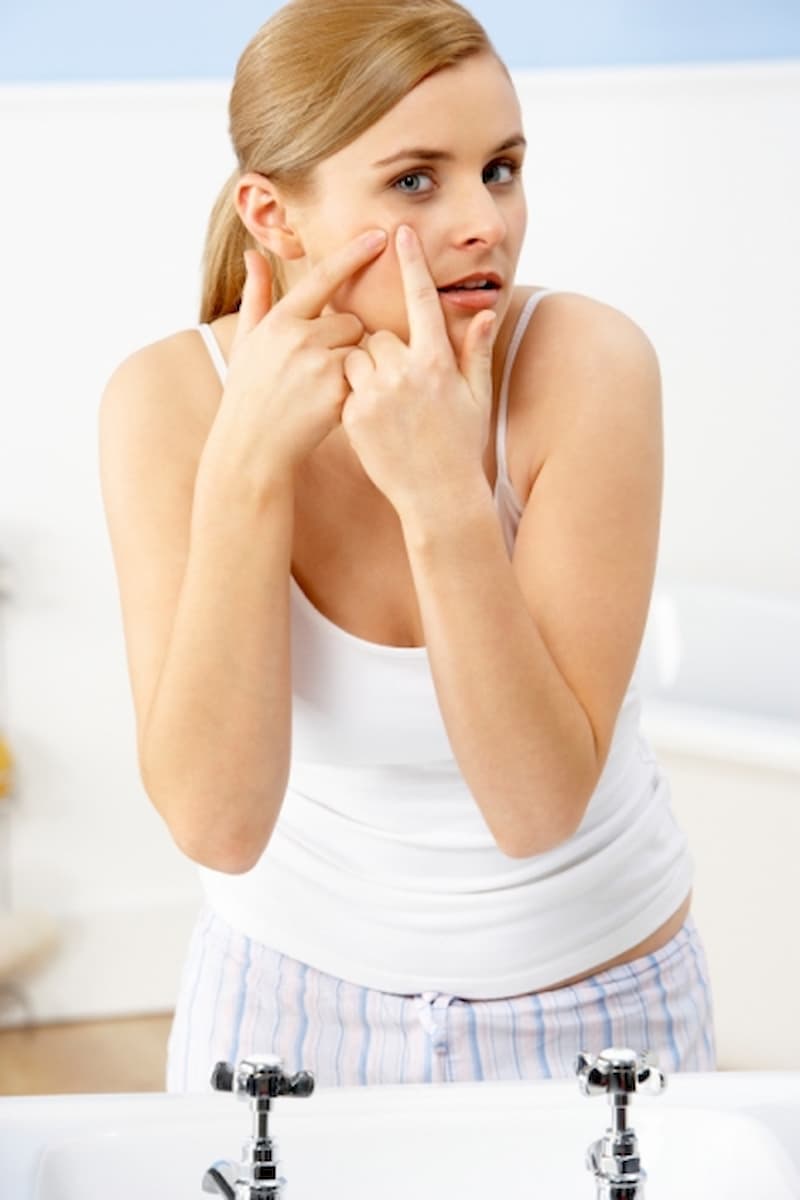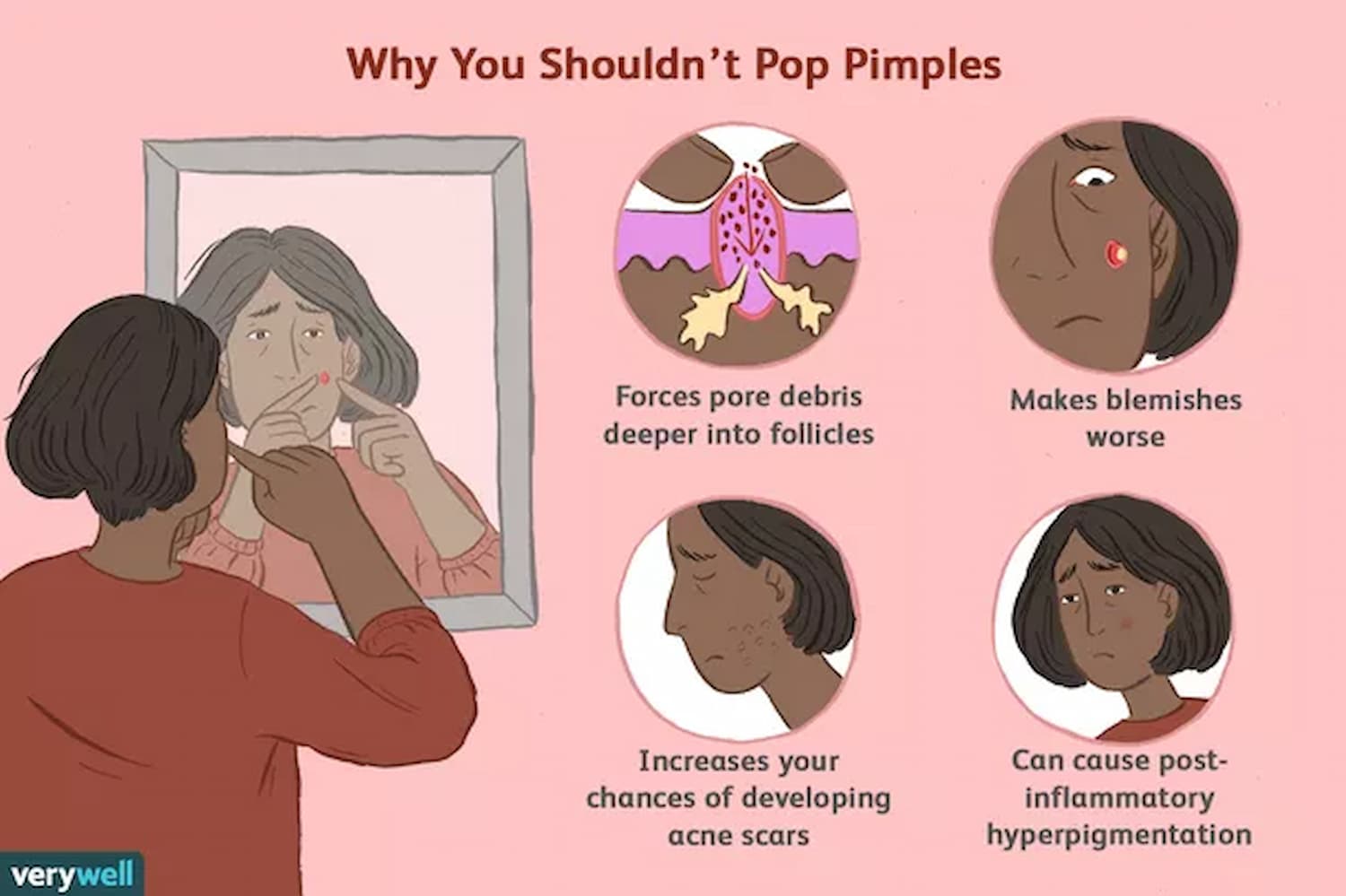
Seeing an unsightly spot on your face just a day or two before a big event may tempt you to squeeze it. People tend to squeeze their spots, thinking that releasing the tissue build-up underneath the skin may reduce the swelling and make the pimple go away. Picking at your spots may only irritate your skin and make your skin look worse than it already is.
The skin on your face is composed of two layers: the outer layer, or epidermis, and the deeper layer or dermis. The dermis contains the hair follicles and sebaceous glands, or oil glands, which produce sebum or oil. Your skin regularly secretes oil and pushes it out into the epidermis to lubricate it and keep it smooth. Oftentimes, the oil glands may produce excess sebum which may rise to the outer layer of the skin, leading to clogged pores that cause sebaceous cysts, acne breakouts or different types of pimples. Trapped dead skin cells and oil may stagnate in the pore and attract bacteria. When abnormal sebum levels leak into the surrounding skin tissue, it may cause swelling, redness and inflammation.
Squeezing your spots can cause tiny wounds on your face, increasing your risk of scarring and further bacterial infections. The pressure you apply to your spot may also push the build-up of abnormal sebum to nearby tissues, making the spot appear bigger and redder.
 Source: verywellhealth
Source: verywellhealth
Most skin eruptions subside and disappear without manual intervention. Regular facial skin care is the best way to deal with spots and unsightly blemishes. This will reduce excess oil production and clear the skin of blackheads, whiteheads and, in the worst-case scenario, severe acne.
How to Care for Your Facial Skin
People look at your face all the time, whether you like it or not. They rarely look at the feet or hands of the person they are conversing with; really, it is always the face. That said, it's important to maintain clean, clear skin that you can be proud of. Maintaining healthy skin does not entail expensive skin products. Consider the following natural treatment options for your daily skincare routine:
- Clean your face regularly. Washing with a mild soap or mild cleanser at least twice a day, or whenever your skin feels oily, prevents sebum and dead skin cells from building up.
- Do something about your hair. Your hair may also carry extra oil to your face. Wash your hair frequently and keep it short or away from your face.
- Exfoliate your skin. Exfoliation removes dead skin and dirt that may be trapped in the epidermis. For oily skin, using a gentle facial scrub no more than three times a week helps keep the spots away while giving your skin a fresh and smooth appearance. When using a chemical exfoliant, exercise caution because it may do more harm than good to your skin. If in doubt, seek the advice of a dermatologist first.
- Treat spots with tea tree oil. Tea tree oil is an effective acne treatment as it contains antibacterial properties that fight acne-causing bacteria. It works just as well as over-the-counter acne treatments without causing dryness. Tea tree oil also works gently with all skin types.
- Consume more fresh fruits and vegetables. A diet that is high in fibre, vitamins A and C and beta-carotene helps prevent the formation of spots. Fibre cleanses your bowels and prevents toxins from reaching your skin, where these may cause irritation. Vitamins A, C and beta-carotene are powerful antioxidants that help fight free radicals that may damage your skin. Vitamin A also contributes to skin renewal and prevents dead skin build-up, while Vitamin C promotes healing of existing spots.
- Eat live foods. Live foods, such as yoghurt, contain good bacteria, which your body needs to inhibit the growth of bad bacteria that could be causing your spots. Look for food products with probiotics like lactobacilli and bifidobacteria.
- Drink plenty of water. Water flushes out toxins that can clog or irritate your skin. It also hydrates your skin from within, making it appear healthy and glowing.
- Use an oil-free moisturiser. Combination skin types are fairly common. You have combination skin when only a portion of your face such as the T-zone is oily while the rest of your skin feels dry. If you must moisturise, dab an oil-free moisturiser only on the areas where it is needed.
- Be sure to check the label of your skincare products. Choose products that contain glycolic acid, salicylic acid and alpha hydroxy acids, as these ingredients aid in the removal of dead skin cells and the protection of pores from clogging.
If your acne does not clear up after treatment, you may need to see a dermatologist. They may recommend topical treatments, laser therapy, or even lifestyle changes. It's important to remember that treating acne takes time, and there's no one-size-fits-all solution.
Originally published on Jul 21, 2009








